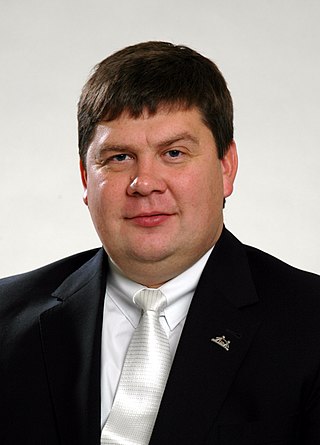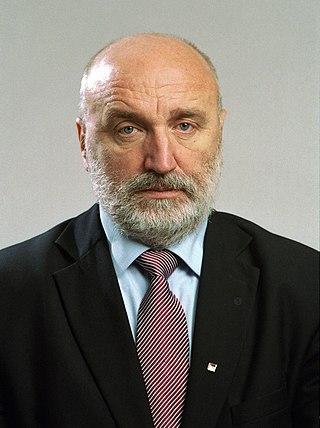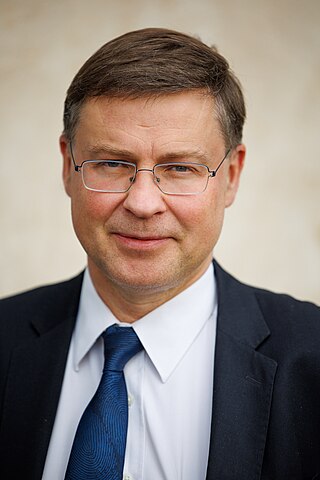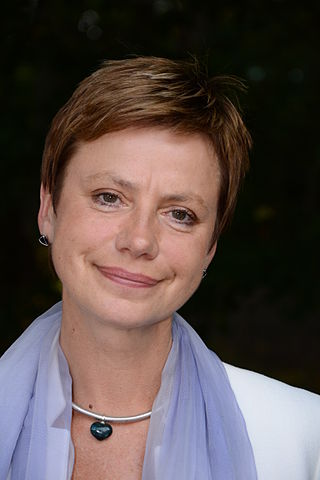
The politics of Latvia takes place in a framework of a parliamentary representative democratic republic, whereby the prime minister is the head of government, and of a multi-party system. The President holds a primarily ceremonial role as Head of State. Executive power is exercised by the government. Legislative power is vested in both the government and parliament, the Saeima. The Judiciary is independent of the executive and the legislature. The Economist Intelligence Unit rated Latvia a "flawed democracy" in 2022.

The People's Party was a conservative political party in Latvia. The People's Party was the leader of three governments and a member of another four.

Aigars Kalvītis is a Latvian businessman and a former politician who was the Prime Minister of Latvia from 2004 to 2007. Currently he is the president of Latvian Ice Hockey Federation and the Chairman of the Board of Latvian gas company Latvijas Gāze. He is the Chairman of the Council of Latvian telecommunications company Tet.

Valdis Dombrovskis is a Latvian politician serving as Executive Vice President of the European Commission for An Economy that Works for People since 2019 and European Commissioner for Trade since 2020. He previously served as European Commissioner for Financial Stability, Financial Services and Capital Markets Union from 2016 to 2020 and Prime Minister of Latvia from 2009 to 2014.

Ivars Godmanis is a Latvian politician who served as the prime minister of Latvia from 1990 to 1993 and again from 2007 to 2009. He was the first prime minister of Latvia after the country restored its independence from the Soviet Union.

The European Commissioner for Trade is the member of the European Commission responsible for the European Union's common commercial policy.

Mareks Segliņš is a Latvian politician of People's Party and a lawyer. He is the former Minister of Justice of Latvia, as well as former Minister of the Interior of Latvia.

Parliamentary elections were held in Latvia on 2 October 2010. It was the first parliamentary election to be held in Latvia since the beginning of the economic crisis during which Latvia had experienced one of the deepest recessions in the world.

The second Tymoshenko Government was appointed on 18 December 2007 as a coalition between Bloc of Yulia Tymoshenko (BYuT) and Our Ukraine-People's Self-Defense Bloc (OU-PSD), OU-PSD is the party of then-President of Ukraine Viktor Yushchenko, following the 2007 Ukrainian parliamentary election. The government program was named: "Ukrainian breakthrough: for people, not for politicians".
Unity is a liberal-conservative political party in Latvia. It is a member of the New Unity alliance and is positioned on the centre-right on the political spectrum. Since 2017, its chairman of the Main Board has been the former Minister for Economics of Latvia, Arvils Ašeradens, who succeeded former European Commissioner Andris Piebalgs.

Artis Kampars is a Latvian politician and businessman. He served as the Minister for Economics of Latvia. Kampars is a member of Unity.

Sarmīte Ēlerte is a Latvian politician who is a member of the Unity party. She was Minister of Culture of Latvia from 3 November 2010 until 25 October 2011.

The third Dombrovskis cabinet was the government of Latvia from 25 October 2011 to 22 January 2014. It was the third government to be led by Valdis Dombrovskis who was Prime Minister from 2009 until 2014. It took office after the September 2011 election, succeeding the second Dombrovskis cabinet, which had lasted from 2010 to 2011.

The second Dombrovskis cabinet was the government of Latvia from 3 November 2010 to 25 October 2011. It was the second government to be led by Valdis Dombrovskis, who was Prime Minister between 2009 and 2014. It took office on 3 November 2010, after the October 2010 election, succeeding the first Dombrovskis cabinet, which had lasted from 2009 to 2010. It was replaced by the third Dombrovskis cabinet on 25 October 2011, after the September 2011 election.

The second Godmanis cabinet was the government of Latvia from 20 December 2007 to 12 March 2009. It was the second government to be led by Ivars Godmanis, who was also Prime Minister from 1990 to 1993. It took office on 20 December 2007, after the resignation of Ivars Godmanis, succeeding the second Kalvītis cabinet, which had lasted from 2007 to 2009. It was replaced by the second Dombrovskis cabinet on 3 November 2010, after the October 2010 election.

The second Kalvītis cabinet was the government of Latvia from 7 November 2006 to 20 December 2007. It was the second government to be led by Aigars Kalvītis, who had previously been prime minister since 2004. It took office on 7 November 2006, after the October 2006 election, succeeding the first Kalvītis cabinet, which had lasted from 2004 to 2006. It was replaced by the second Godmanis cabinet on 20 December 2007, after the resignation of Kalvītis.

The first Godmanis cabinet was the government of Latvia from 7 May 1990 to 3 August 1993. It led Latvia to a restoration of its independence from the Soviet Union and was the first of two governments to be led by Ivars Godmanis, who was also Prime Minister from 2007 to 2009. It took office on 7 May 1990. It was replaced by the Birkavs cabinet on 3 August 1993, after the June 1993 election.

Edgars Rinkēvičs is a Latvian public official and politician serving as the 11th and current president of Latvia since July 2023. He previously served as the minister of foreign affairs of Latvia from 2011 to 2023, and head of the Chancery of the President of Latvia as state secretary of the Ministry of Defence, as well as a deputy of the Saeima.

Laimdota Straujuma is a Latvian economist who was the prime minister of Latvia from January 2014 to February 2016. Before her tenure as prime minister, she served as the minister of Agriculture from 2011 to 2014. She was the first woman to serve as the head of government of the country. After her resignation on 7 December 2015, she announced her intention to resume a seat in the Saeima.

The First Straujuma cabinet was the government of Latvia from 22 January to 5 November 2014. It was the first government to be led by Laimdota Straujuma, who was Prime Minister between 2014 and 2016. It took office on 22 January 2014, after the resignation of Valdis Dombrovskis. It was abolished on November 5 the same year at the formation of the Second Straujuma cabinet.













